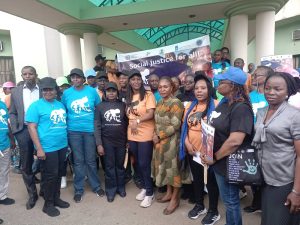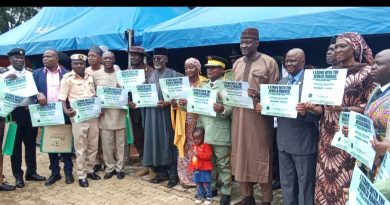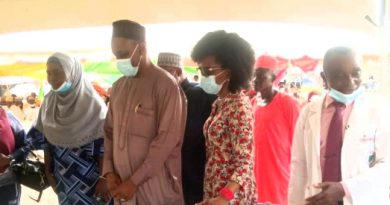End Child labour Else We May Not Have Future Leaders – PS Daju
Maryam Aminu
World Day Against Child Labour aims to focus attention on the global extent of child labor and the action and efforts needed to eliminate it. Each year on 12 June, the Day brings together governments, employers, organizations, and civil society, as well as millions of people from around the world to highlight the plight of child laborers and what can be done to help them. But because of the significance of June 12 which is democracy in Nigeria, the date was shifted for the commemoration of world child labour day.
The Permanent Secretary, Federal Ministry of Labour and Employment, Kachollom Daju said children are the leaders of tomorrow and called on the public to end child labour to avoid scarcity of Future Leaders.
She made the call while leading a walk to commemorate the world day against child labour stressing the need of eradicating child labour.
PS Kachollom Daju underlined the Government of Nigeria’s commitment to working with communities, CSOs, NGOs schools, and other relevant stakeholders to establish a society where all children are free from exploitation.
“We must protect our children and provide them with access to education and opportunities to reach their full potential,” Daju stated.
In Nigeria, it is estimated that over 43% Nigerian children aged between five and 11 years are involved in economic activities, including being engaged in the worst forms of child labour,” she said.
The Permanent Secretary, while quoting the 2016 – 2017 MICS Survey, said that 39%of children involved in child labour work under hazardous conditions.
She said that this includes quarrying granite, artisanal mining, commercial sexual exploitation, armed conflict, and sometimes victims of human trafficking.
The adoption and ratification of ILO Conventions No.138 and No.182, enactment of the Child Rights Act to domesticate the UN Convention on the Rights of the Child, among others.
domesticate the UN Convention on the Rights of the Child, among others.
“We remain committed to collaborating with all of our partners to end child labour and promote social justice for all.” she said.
Speaking also, the Country Director International Labour Organization (ILO), PHALA VANESSA said their duty is to put in place the legislation, system and to build capacity inorder to address issues of child labour.
Phala noted that with their collaboration with ministry of labour, they have been able to engage 2 States to key into artisanal small scale mining and agriculture (cocoa) farm.
She added that ILO is not just supporting the elimination of child labour but engaging the parents, community, teachers to make sure that they create a conducive environment for young persons to go to school,stay in school and make a meaningful contribution to the economy of Nigeria.
The Country Director added that they are partnering with the National Bureau of Statistics to enable them produce child labour statistics and the organization looks forward to the launch of the report that will actually give factual data in terms of the spread of child labour in the different states in Nigeria,the sectors the children are engaged and the kind of hazard the children are exposed to.
Reacting on behalf of the Executive Secretary of the National Human Rights Commission,Tony Ojukwu SAN, the Director Women and Children, Grace Pam, said the commission is a statutory body mandated to promote and protect human rights, our involvement is instrumental in addressing the challenges posed by child labour and championing the rights and well-being of children across the nation.”
Ojukwu added that the world child labour day is not only a mere symbolic event but a powerful catalyst for change to amplify the voices of those children unheard and marginalized.
He tasked all to play a role in ensuring that the menace of child labour is brought to an end.
The Executive Secretary further implore all to create a world where no child is forced to sacrifice their potential for the sake of survival.




